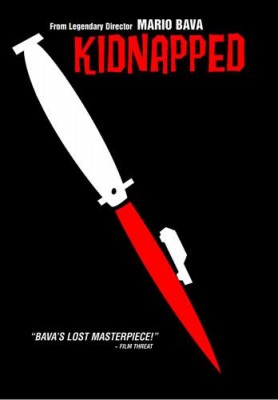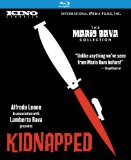| Reviews & Columns |
|
Reviews DVD TV on DVD Blu-ray 4K UHD International DVDs In Theaters Reviews by Studio Video Games Features Collector Series DVDs Easter Egg Database Interviews DVD Talk Radio Feature Articles Columns Anime Talk DVD Savant Horror DVDs The M.O.D. Squad Art House HD Talk Silent DVD
|
DVD Talk Forum |
|
|
| Resources |
|
DVD Price Search Customer Service #'s RCE Info Links |
|
Columns
|
|
|
Kidnapped (aka Rabid Dogs)
But then seemingly out of nowhere Mario Bava made the nihilistic masterpiece variously known today as Rabid Dogs and, as here, Kidnapped. Though it plays with themes the director dabbled with throughout his career, visually this brutal Italo-crime film resembles Bava '60s masterpieces not at all.
And yet, what an incredible achievement it is. I'm generally repulsed by today's allegedly fashionable nihilist films (e.g., almost anything by David Fincher). Bava's film, on the other hand, is so clever, subtle despite its brutality, and utterly engrossing it makes for a unique and very rewarding viewing experience.
Rabid Dogs/Kidnapped is all the more remarkable considering its torturous, problem-plagued history. It was filmed in 1974 under the working title Semaforo rosso ("Red Light") with an already tight budget to begin with. But then, with at least 95% of the film shot, edited, and in the can, and a musical score already in progress, the production company bankrolling the film went belly-up. Italian courts seized control of the film. In 1980, Mario Bava died at the age of 65 with the picture he regarded as the most important of his career never having been shown commercially during his lifetime.
Actress Lea Lander, one of the film's stars, eventually paid off its numerous debts and acquired distribution rights, but had limited success with the mostly-but-not entirely-finished film, essentially a streamlined work print, variously called Red Light and, later, Rabid Dogs.
The better-connected Alfredo Leone, holder of the U.S. rights to most of Bava's pictures, acquired Rabid Dogs from Lander, creating in 2007 an entirely new version of the movie he called Kidnapped. For this release, the Italian voice track was entirely redone, the music re-orchestrated and rerecorded and, critically, new footage (directed by Lamberto Bava, Mario's son) apparently in Allesandro Parenzo's original script but never shot, was filmed and these brand-new scenes integrated into the preexisting footage. The opening titles were completely replaced, and some cutting of Bava's original footage, some of it aesthetically damaging, was made.
Both versions of the film, the nearly complete Rabid Dogs, first exhibited in 1998, and the 2007 Kidnapped were released to DVD by Anchor Bay along with an audio commentary by Tim Lucas and informative featurette about the production and its resurrection. But Kino's new Blu-ray includes only the Alfredo Leone-produced Kidnapped. The Rabid Dogs cut is not, nor are there any extras beyond a few Mario Bava trailers.
A botched payroll robbery leaves several people dead. Fleeing with a fortune in lira, Doc (Maurice Poli), Blade (Don Backy), and "32" (George Eastman) take a young woman, Maria (Lea Lander), hostage to ensure their escape from the city. Still needing to ditch their getaway car, they appropriate yet another vehicle, kidnapping its driver, Riccardo (Riccardo Cucciolla), and Tino, a small, unconscious boy tightly wrapped in blankets who Riccardo explains needs immediate medical treatment. Ignoring Riccardo's pleas, the thieves drive further out of the city, using their hostages and Riccardo's vehicle to elude detection.
(Mild Spoilers): The film is fascinating on several levels, most intriguingly when I first saw the picture (the Rabid Dogs cut) its shocking ending (I won't give it away here) took me completely by surprise. Clever little clues throughout the picture clearly point to its conclusion, and I could sense things weren't quite what they seemed to be, but on me anyway, it was an entirely successful ruse.
Even without it, though, the film is a captivating, subtly portrayed (or deliberately unsubtly portrayed, as the case may be) character study. Robbery mastermind Doc, clearly intelligent if ruthless, increasingly regrets the animal-like cruelty of his sadistic coconspirators: the deranged Blade, who fantasizes about skinning human flesh, and his best pal "32" (so named because "women love every centimeter"), a misogynistic giant (he seems around 6'4") who risks capture by openly raping Maria in the back seat, plainly visible to all highway passersby. Accurately described as filthy pigs, these men sadistically take pleasure in humiliating and dehumanizing their hostages.
Doc, in the front passenger seat, disapproves of their behavior but, recognizing his limited authority over them, lets them get away with most of their thuggery without comment until one of them crosses the line. Maria runs and screams and struggles like mad for most of the film's 90-plus minutes, while Riccardo, one eye always on the unconscious little boy, bides his time. Like Kuranosuke Oishi in the classic Kabuki play Chushingura, is Riccardo merely playing the submissive captive while plotting some escape? Time will tell.
The film is still quite disturbing though graphically quite tame. (The acting, rather than makeup effects, sell the extreme brutality of its violence.) Partly why the film works so well is that it's told more or less in real time and the action is confined to the cramped, swelteringly hot vehicle where the five adults and one boy are packed in like sardines. Producer Leone's Kidnapped version cuts away at least three times to new footage, shot in 2007 but which matches the older scenes reasonably well, of a nervous woman on the phone with the police, her presence in the film unclear until the end. None of these scenes should have been added, however, as they dissipate tension in the vehicle and, for some viewers, will give away the sting at the film's tail, whose impact is severely lessened in the Kidnapped version because it has been shortened and the pacing of this critical moment all but destroyed.
Video & Audio
Kino's 1080p, 1.78:1 transfer of Kidnapped looks great throughout, but it leaves one wondering if this release, sent to us as "Kidnapped: Standard Edition Remastered" implies a more complete Blu-ray release with both versions, similar to Anchor Bay's 2007 DVD, may be on the horizon, or if like Black Sabbath a superior Region B release will emerge from Great Britain. The LPCM audio, in Italian only with optional English subtitles, is strong. No Extra Features, unless one counts Kino's trailers for other Bava titles in their catalog.
Parting Thoughts
Not nearly as ruinous as Kino's Black Sabbath but still very problematic, Kidnapped is nonetheless essential viewing and, for now at least, the best available version picture-wise. Recommended.
Stuart Galbraith IV is a Kyoto-based film historian whose work includes film history books, DVD and Blu-ray audio commentaries and special features. Visit Stuart's Cine Blogarama here.
|
| Popular Reviews |
| Sponsored Links |
|
|
| Sponsored Links |
|
|
| Release List | Reviews | Shop | Newsletter | Forum | DVD Giveaways | Blu-Ray | Advertise |
|
Copyright 2024 DVDTalk.com All Rights Reserved. Legal Info, Privacy Policy, Terms of Use,
Manage Preferences,
Your Privacy Choices | |||||||













